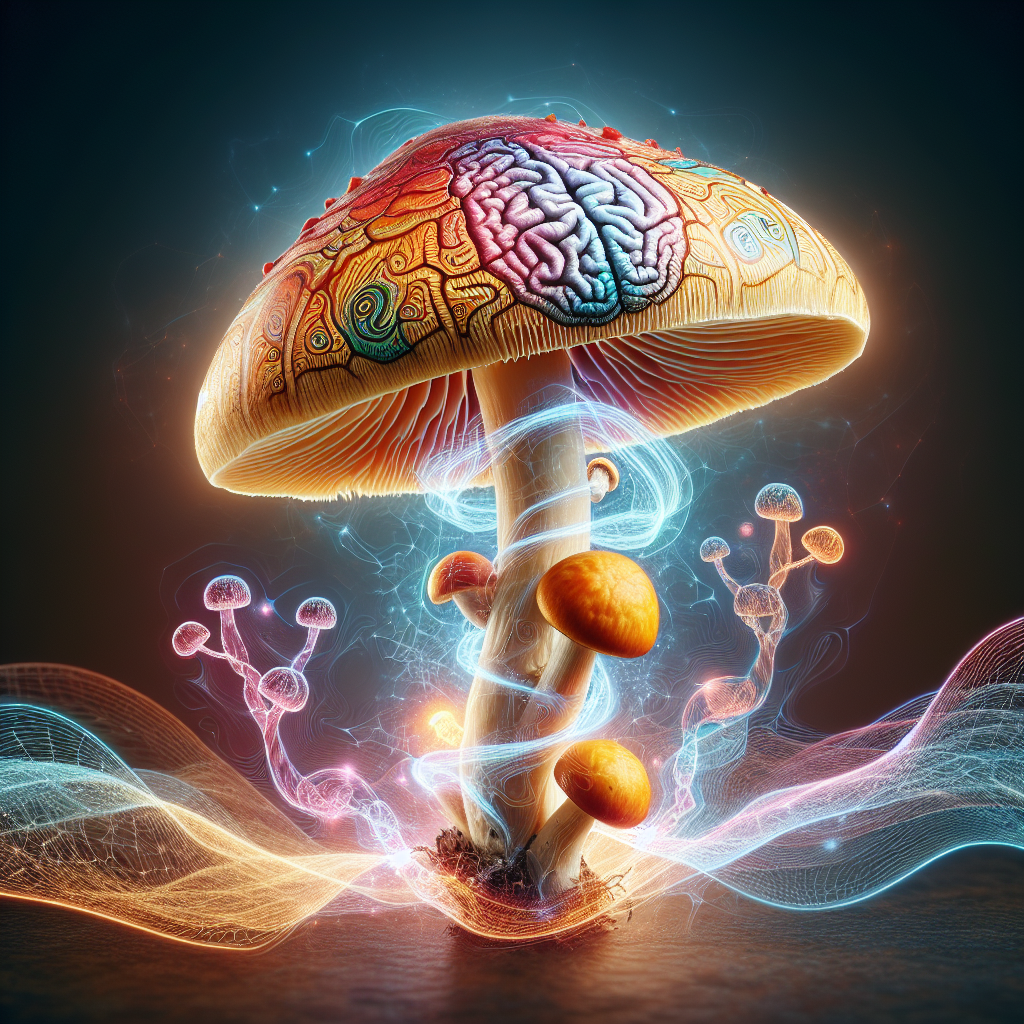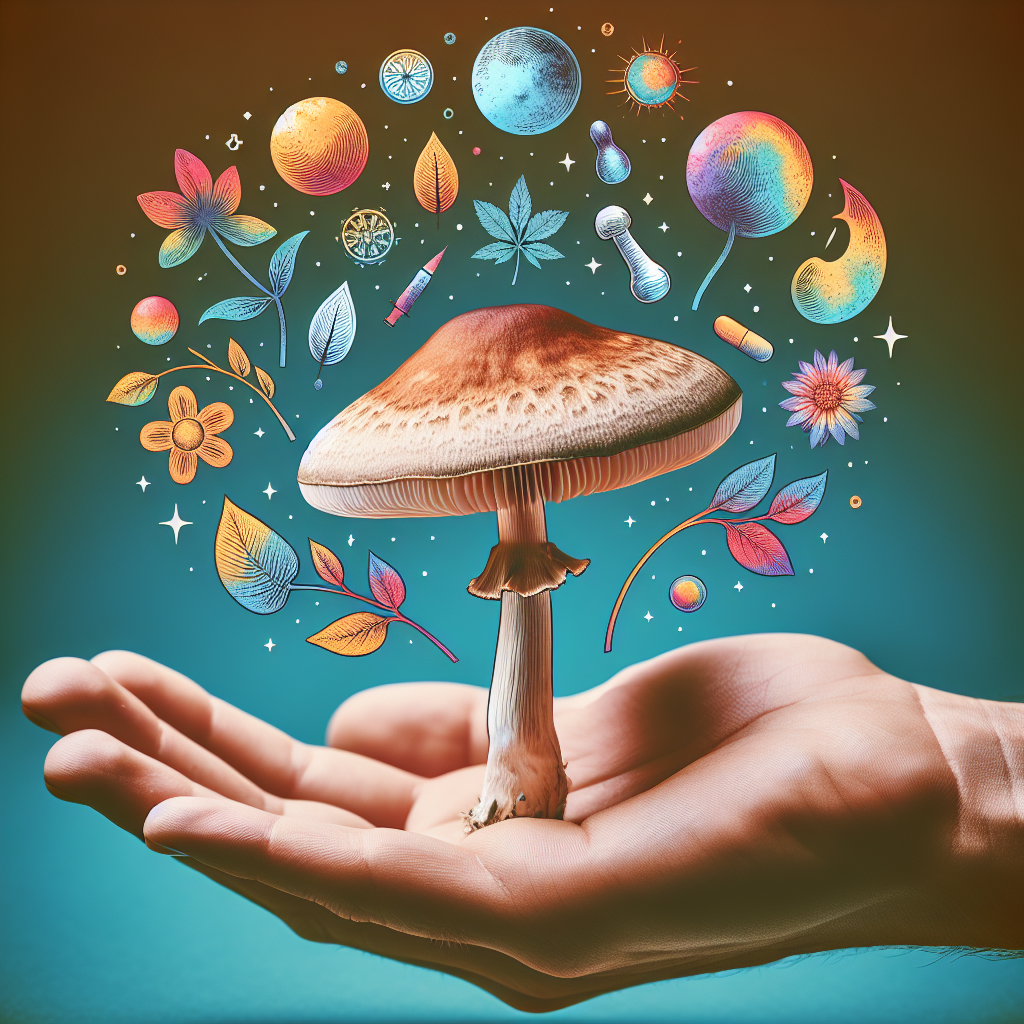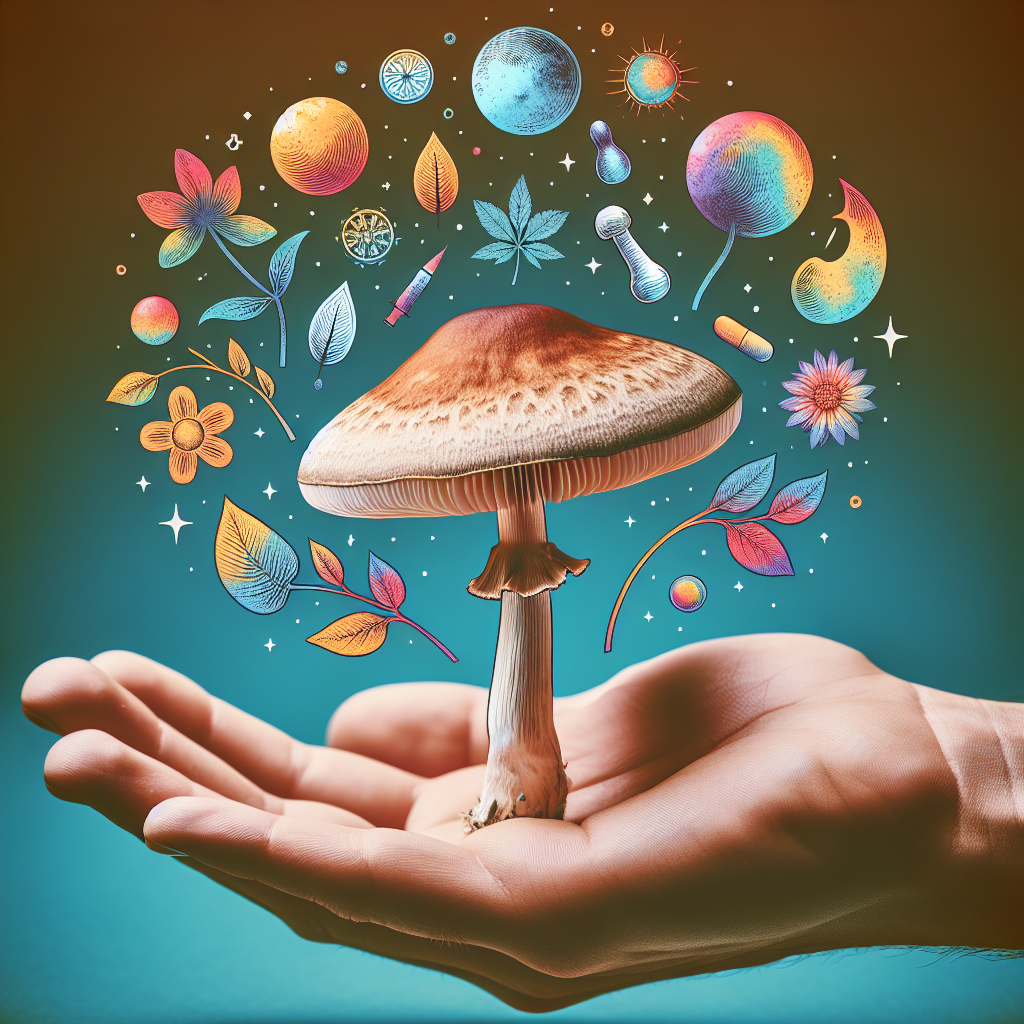Have you ever wondered about the healing powers of psilocybin mushrooms? These elusive fungi have gained popularity in recent years for their potential therapeutic benefits. From reducing anxiety and depression to promoting emotional and spiritual growth, psilocybin mushrooms are being researched for their ability to tap into the depths of our subconscious minds and provide profound healing experiences. In this article, we will explore the fascinating potential of these powerful mushrooms and how they may offer new avenues for mental health treatment. So, grab a cup of tea and prepare to embark on a journey into the realm of psilocybin therapy!

Understanding Psilocybin Mushrooms
What are Psilocybin Mushrooms?
Psilocybin mushrooms, also known as magic mushrooms or shrooms, are a type of fungi that contain the psychoactive compound psilocybin. These mushrooms belong to the genus Psilocybe and several other closely related genera. Psilocybin, when ingested, is converted by the body into psilocin, which interacts with serotonin receptors in the brain, resulting in profound psychoactive effects.
History of Psilocybin Mushrooms
Psilocybin mushrooms have a rich cultural and spiritual history that dates back thousands of years. Indigenous cultures in various parts of the world, such as Mesoamerica, have used these mushrooms for religious and healing purposes. The ancient Aztecs referred to psilocybin mushrooms as “teonanácatl,” meaning “flesh of the gods,” and considered them sacred. These mushrooms have also been used in traditional rituals and ceremonies by other indigenous cultures, including the Mazatec people in Mexico.
Chemical Composition of Psilocybin Mushrooms
Psilocybin mushrooms contain varying levels of psilocybin, the primary psychoactive compound. Alongside psilocin, other important compounds found in these mushrooms include baeocystin and norbaeocystin. These compounds, collectively known as tryptamines, have structural similarities to naturally occurring neurotransmitters like serotonin, allowing them to interact with specific receptors in the brain. The potency and effects of psilocybin mushrooms can vary depending on the species and growing conditions.
Effects of Psilocybin Mushrooms
Psychedelic Properties
Psilocybin mushrooms are well-known for their psychedelic properties, which can induce altered states of consciousness and profound sensory experiences. The effects typically begin within 20-60 minutes of ingestion and can last for several hours. Users frequently describe experiencing visual distortions, such as vibrant colors, patterns, and hallucinations. The overall psychedelic experience is highly subjective and can vary greatly from person to person.
Altered States of Consciousness
The consumption of psilocybin mushrooms often leads to altered states of consciousness, also referred to as “trips.” These states can be characterized by intensified perception, enhanced creativity, and a sense of interconnectedness with the surrounding environment. Users may also experience a heightened sense of spirituality and an expanded understanding of their own consciousness and existence.
Psychological Effects
Psilocybin mushrooms have been reported to produce a range of psychological effects. Users often describe feelings of euphoria, introspection, and emotional openness. The mushrooms can facilitate deep self-reflection and personal insights, often leading to a sense of personal growth and a shift in perspective. Some individuals have described their experiences with psilocybin mushrooms as “life-changing” or “spiritually transformative.”
Physiological Effects
In addition to their psychological effects, psilocybin mushrooms can also produce physiological effects. These may include changes in heart rate, blood pressure, and body temperature. Users may also experience dilated pupils and changes in coordination and motor skills. While the physical effects of psilocybin mushrooms are generally considered to be mild, it is important to note that individual reactions can vary.
Research on Psilocybin Mushrooms
Early Studies
Research on psilocybin mushrooms began in the mid-20th century, with notable contributions from scientists such as Albert Hofmann and Timothy Leary. These early studies focused on the psychological effects of psilocybin and its potential therapeutic applications. However, due to the political and social climate of the time, research into psychedelics was severely restricted, leading to a significant gap in scientific knowledge.
Contemporary Research
In recent years, there has been a resurgence of interest in psilocybin mushrooms and their therapeutic potential. Contemporary research has focused on elucidating the mechanisms of action, exploring the benefits in various mental health conditions, and conducting rigorous clinical trials. The results of these studies have been promising, indicating that psilocybin therapy may hold great promise in the field of mental health care.
Clinical Trials
Clinical trials involving psilocybin mushrooms have shown promising results in the treatment of mental health disorders. Studies have explored the use of psilocybin-assisted therapy in conditions such as depression, anxiety, post-traumatic stress disorder (PTSD), and substance use disorders. The findings suggest that psilocybin therapy, when combined with appropriate psychological support, can lead to significant improvements in symptoms and overall well-being.
Therapeutic Applications
Psychotherapy
Psilocybin-assisted psychotherapy is an emerging field that combines the therapeutic potential of psilocybin mushrooms with traditional talk therapy techniques. The psychedelic experience can serve as a catalyst for deep exploration and healing, enhancing the therapeutic process. Under the guidance of trained professionals, individuals can navigate their subconscious and address underlying emotional issues, promoting personal growth and psychological well-being.
Mental Health Disorders
Research has shown promising results in using psilocybin therapy for various mental health disorders. Depression, anxiety, and PTSD are among the conditions being extensively studied. Psilocybin-assisted therapy has been found to reduce symptoms, enhance emotional resilience, and improve overall quality of life. While more research is needed, early findings suggest that psilocybin mushrooms may have significant therapeutic potential in the treatment of these disorders.
Addiction Treatment
Psilocybin mushrooms have shown promise in the field of addiction treatment. Studies have explored their potential to treat substance use disorders, including alcohol and tobacco addiction. Psilocybin therapy can help individuals gain new insights into their addictive behaviors, break patterns of compulsive behavior, and foster a sense of self-empowerment and motivation for change. It is important to note that these studies are still in their early stages, and more research is needed to establish the efficacy and safety of psilocybin-assisted addiction treatment.
Palliative Care
Psilocybin therapy has also been investigated as a supportive tool in palliative care settings. For individuals facing life-threatening illnesses, psilocybin-assisted therapy can provide profound psychological and existential support. The experiences facilitated by psilocybin mushrooms can help individuals come to terms with their mortality, reduce existential distress, and improve their overall quality of life during their remaining time.

Psychological Benefits of Psilocybin Therapy
Enhanced Emotional Well-being
One of the primary psychological benefits reported by individuals who have undergone psilocybin therapy is an enhanced sense of emotional well-being. The profound experiences facilitated by psilocybin mushrooms can help individuals gain a new perspective on their emotions and develop a deeper understanding of themselves. This enhanced emotional well-being can lead to improved resilience in the face of life’s challenges and a greater capacity for emotional healing and growth.
Reduced Depression and Anxiety
Clinical trials have shown promising results in using psilocybin therapy to alleviate symptoms of depression and anxiety. The psychedelic experience can provide individuals with a sense of perspective, allowing them to break free from negative thought patterns and deeply ingrained emotional responses. By disrupting the neural pathways associated with depression and anxiety, psilocybin mushrooms can create an opportunity for profound healing and long-lasting relief.
Improved Quality of Life
Psilocybin therapy has the potential to significantly improve the overall quality of life for individuals struggling with mental health issues. By addressing the underlying emotional and psychological factors contributing to their distress, psilocybin-assisted therapy can lead to a more fulfilling and meaningful existence. This improvement in quality of life extends beyond symptom reduction, as individuals often report a newfound sense of purpose, connection, and appreciation for life.
Increased Mindfulness and Connectedness
The psychedelic experience induced by psilocybin mushrooms often leads to an increased sense of mindfulness and connectedness. Individuals frequently describe a heightened awareness of the present moment and a profound interconnectedness with themselves, others, and the natural world. This increased mindfulness can bring about a shift in perspective, leading to greater compassion, empathy, and a deepened sense of connection to oneself and others.
Safety and Side Effects
Physical Safety Measures
While psilocybin mushrooms are generally considered safe when used responsibly, it is important to take certain precautions to ensure physical safety. This includes carefully selecting mushrooms from reliable sources and properly identifying the species to avoid accidental ingestion of toxic varieties. It is also essential to start with a low dose to gauge individual sensitivity and gradually increase as necessary. Additionally, taking psilocybin in a safe, comfortable, and supportive environment with trusted individuals is highly recommended.
Psychological Considerations
Psilocybin therapy can bring about intense psychological experiences, and individuals should be prepared for potential challenges. It is crucial to approach the experience with a mindset of curiosity, openness, and self-compassion. Being guided by trained professionals during the therapy session can provide a safe container for navigating challenging emotions and ensuring emotional support throughout the journey. Integration sessions following the experience can further help individuals process and make sense of their psychedelic insights.
Potential Risks and Precautions
While the physical risks of psilocybin mushrooms are generally low, there are some potential risks and precautions to consider. Some individuals may experience temporary gastrointestinal discomfort, such as nausea or vomiting, shortly after ingestion. Individuals with pre-existing mental health conditions, such as psychosis or severe anxiety disorders, should exercise caution when considering psilocybin therapy, as the psychedelic experience can be intense and potentially challenging for those who are not adequately prepared or supported.
Legal Status
International Regulations
The legal status of psilocybin mushrooms varies across countries and jurisdictions. In many countries, psilocybin-containing mushrooms are classified as controlled substances, making their production, distribution, and possession illegal. However, some countries have adopted more lenient approaches, ranging from decriminalization to regulated medical use. It is crucial to be aware of the legal landscape in your specific location and act in accordance with the applicable laws and regulations.
Decriminalization and Legalization Efforts
In recent years, there has been an increasing movement towards the decriminalization and legalization of psilocybin mushrooms. Some cities and states in various countries have implemented policies that prioritize harm reduction and emphasize therapeutic potential. These initiatives aim to shift the focus from criminal penalties to public health and medical perspectives, opening up opportunities for further research, exploration, and responsible use of psilocybin mushrooms.
Psilocybin Research Exemptions
In certain countries, limited exemptions for psilocybin research have been granted to allow for scientific investigation into its therapeutic potential. These research exemptions provide a legal framework for conducting clinical trials and studying the effects and safety of psilocybin mushrooms. The results of these studies can contribute to evidence-based decision-making regarding the regulatory status of psilocybin and inform future policies surrounding its medical and therapeutic use.
Challenges and Future Directions
Regulation and Access
One of the major challenges in the field of psilocybin therapy is establishing appropriate regulatory frameworks and ensuring safe and equitable access to treatment. Balancing the need for regulatory oversight with the potential therapeutic benefits of psilocybin mushrooms poses a complex task for policymakers. Developing guidelines for the training and certification of therapists, as well as quality control measures for mushroom production, are critical steps in ensuring safe and effective use of psilocybin therapy in clinical settings.
Integration into Mainstream Medicine
The integration of psilocybin therapy into mainstream medicine poses both challenges and opportunities. Bridging the gap between traditional medical practices and psychedelic therapy requires education, awareness, and collaboration among healthcare professionals. Integrating psilocybin therapy into existing mental health treatments and developing comprehensive care models will be vital in realizing the full therapeutic potential of these mushrooms.
Long-Term Effects and Follow-up
As the field of psilocybin therapy continues to evolve, long-term effects and follow-up studies are essential for understanding the safety and efficacy of these treatments. Examining the lasting impact of psilocybin-assisted therapy on mental health outcomes, quality of life, and personal growth can further inform therapeutic protocols. Longitudinal studies are necessary to assess the potential risks, benefits, and sustainability of psilocybin therapy over time.
Education and Public Perception
Education plays a crucial role in shaping public perception and understanding of the therapeutic potential of psilocybin mushrooms. Disseminating accurate information and dispelling myths surrounding these substances is essential to promote responsible and informed use. Public education campaigns, training programs for healthcare professionals, and open discussions can contribute to a more comprehensive understanding of psilocybin therapy and its potential benefits.
Conclusion
Psilocybin mushrooms hold great promise as a therapeutic tool for various mental health conditions. With their profound effects on consciousness and emotional well-being, these mushrooms have the potential to revolutionize the field of psychotherapy and add a valuable tool to the treatment arsenal. Continued research, clinical trials, and integration efforts are necessary to fully realize the therapeutic potential of psilocybin mushrooms and ensure safe, effective, and accessible treatments for those in need. By embracing evidence-based approaches, fostering responsible use, and addressing regulatory challenges, we can pave the way for a future where psilocybin therapy becomes a mainstream and validated approach to mental health care.
